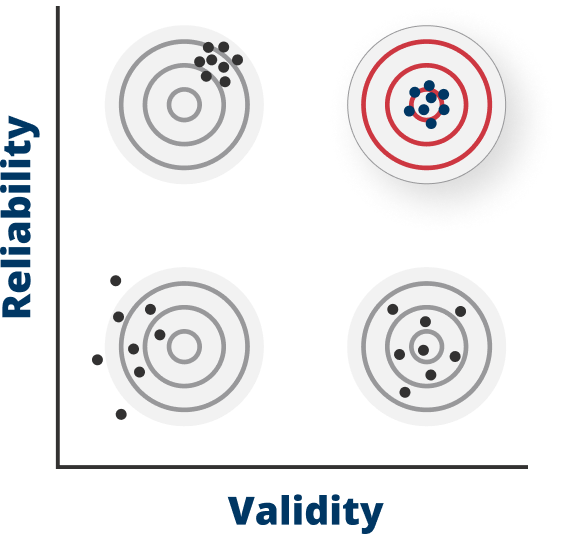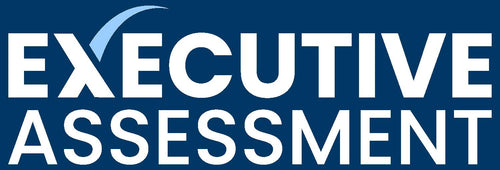You may be wondering how accurate and legitimate the Everything DiSC®assessment is. In short, our answer is this: Each Everything DiSC solution is based on a scientifically valid and reliable assessment to ensure a high-quality, transformational learning experience—every time.

DiSC® Research
DiSC® Research
Psychological instruments are used to measure abstract qualities that we can’t touch or see. These are characteristics like intelligence, extroversion, or honesty. So how do we know whether such tools are providing accurate information or just generating haphazard feedback that sounds believable?
Simply put, if an instrument is useful and accurate, it should meet a variety of different standards that have been established by the scientific community. Validation is the process through which researchers assess the quality of a psychological instrument by testing the tool against these different standards.
Validation asks two fundamental questions:
How reliable is the tool?
That is, researchers ask if an instrument measures consistently and dependably. If the results contain a lot of random variation, it is deemed less reliable.
How valid is the tool?
That is, researchers ask if an instrument measures accurately. The more a tool measures what it proposes to measure, the more valid the tool is.
With nearly 50 years of assessment data and over 10 million individuals assessed, you can feel confident that our assessment meets the highest levels of validity and reliability.
Scales
-
D
Measures a direct, dominant disposition using adjectives such as aggressive, strong-willed, and forceful.
-
I
Measures an interactive, influencing disposition using adjectives such as sociable, lively, and talkative.
-
S
Measures an accommodating, steady disposition using adjectives such as considerate, gentle, and soft-hearted.
-
C
Measures a private, conscientious disposition using adjectives such as analytical, reserved, and unemotional.
-
Di
Measures an active, fast-paced disposition using adjectives such as dynamic, adventurous, and bold.
-
IS
Measures an agreeable, warm, disposition using adjectives such as trusting, cheerful, and caring.
-
sc
Measures a moderate-paced, cautious disposition using adjectives such as careful, soft-spoken, and self-controlled.
-
CD
Measures a questioning, skeptical disposition using adjectives such as cynical, stubborn, and critical.
Reliability
To determine if a tool is reliable, researchers look at the stability and internal consistency of the instrument. Stability is easy to understand. In this case, a researcher would simply have a group of people take the same assessment twice and correlate the results. This is called test-retest reliability. Internal consistency is more difficult to understand. Here, we have the assumption that all the questions (or items) on a given scale are measuring the same trait. Consequently, all these items should, in theory, correlate with each other.
Scale Reliabilities (2 weeks)
| Di | i | iS | S | SC | C | CD | D | N | |
|---|---|---|---|---|---|---|---|---|---|
| Test-Retest | .86 | .87 | .85 | .86 | .88 | .85 | .85 | .86 | 599 |
| Alpha | .90 | .90 | .86 | .87 | .84 | .79 | .87 | .88 | 752 |
Research guarantees that Everything DiSC is both stable and internally consistent. For more information on the reliability of the DiSC scales, see the more in-depth Everything DiSC Research Report(Opens in a new window).
Validation
There are many ways to examine the validity of an assessment. We will provide one example here, but many more are included in the full Everything DiSC Research Report(Opens in a new window).
The DiSC® model proposes that adjacent scales (e.g., Di and i) will have moderate correlations. That is, these correlations should be considerably smaller than the alpha reliabilities of the individual scales. For example, the correlation between the Di and i scales (.50) should be substantially lower than the Alpha reliability of the Di or i scales (both .90).
On the other hand, scales that are theoretically opposite (e.g., i and C) should have strong negative correlations. The table below shows data obtained from a sample of 752 respondents who completed the Everything DiSC assessment. The correlations among all eight scales show strong support for the model. That is, moderate positive correlations among adjacent scales and strong negative correlations are observed between opposite scales.
Scale Intercorrelations
| Di | i | iS | S | SC | C | CD | D | |
|---|---|---|---|---|---|---|---|---|
| Di | .86 | |||||||
| i | .50 | .90 | ||||||
| iS | .04 | .47 | .86 | |||||
| S | -.31 | .03 | .57 | .87 | ||||
| SC | -.73 | -.56 | -.13 | .34 | .84 | |||
| C | -.43 | -.70 | -.49 | -.18 | .45 | .79 | ||
| CD | -.14 | -.37 | -.68 | -.66 | -.08 | .26 | .87 | |
| D | .46 | .14 | -.37 | -.69 | -.62 | -.19 | .42 | .88 |
Results
So, why does this foundation of research matter? The answer is this: an assessment-based learning experience that is revered by learners worldwide.
Everything DiSC has a 97% satisfaction rating among organizations and a 90% accuracy rating from learners around the globe
With 10,000,000+ participants impacted in 150,000+ organizations worldwide (in over 70 countries!), you can feel confident in the quality of each Everything DiSC learning experience.
Solutions That Meet Your Unique Needs
People work together in a variety of contexts. No matter your specific need, Everything DiSC is designed to help everyone in your organization work better together—from individual contributors to C-suite executives.














